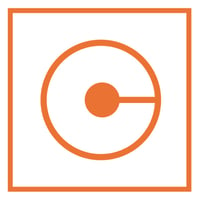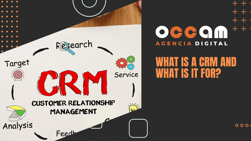Index Content
A CRM system is a tool to manage all the interactions of a company with its customers, both potential and existing ones. It is a technology that helps marketing and sales teams to manage the relationship with customers.
If you haven't seen this term before, don't worry, in this post we explain what it is and what it's for. Read on so you don't miss anything about this topic.
what is a CRM?
Its acronym stands for Customer Relationship Management, although it is more common to see it in English. A CRM is a software that is responsible for managing and analysing the relationships between a company and its customers.
This software allows companies to track customer interactions, maintain contact with customers, streamline processes and improve profitability.
We could say that a CRM is a programme used for the organisation and administration of a company's contacts, where all customer information is stored in a single database. By having this database organised and available to the different departments, each area can act and address the user at the right time.
The Inbound marketing methodology focuses on attracting in a non-intrusive way, and retaining them so that they become loyal customers to your brand. Because nowadays, we are in an era where the customer is at the centre of the strategies, and thanks to new technologies this task can be easier. This is where the CRM comes in to put your leads in order and help you achieve your goals.
what is a CRM for?
The main purpose of CRM software is to manage the company's relationship with the customer, whether it is for the database, sending emails or organising appointments with a salesperson, but the ultimate goal is to build customer loyalty.
In digital marketing this platform is going to help you:
- Automation: Thanks to artificial intelligence, repetitive tasks can be carried out automatically thanks to CRM platforms, for example, sending welcome or promotional emails, the data left by a user when filling in a form, etc.
The main thing is that within the same platform any area of a company can find all the necessary information, which saves time and helps to make better decisions. - Know more about your customers and follow up. Thanks to this type of software you contribute to create more personalised strategies, as you acquire information about your customers.
- Improve the internal communication of your company. By having all the data in the same platform, you do not need to communicate with each section of your company, they can access the information with just one click. It is possible to manage all interactions with the customer from the same place.
- Customer segmentation: thanks to segmentation, you will be able to address the customer in a more personalised way according to their tastes, in order to continue with the purchasing process in a more efficient way.
In short, it is a tool that facilitates the work of your company, as it is a software that integrates all the interactions that occur between your company and your customers into a single database. In turn, it enriches the relationship between the customer and their experience with your brand.
CRM serves to optimise the workflows of all the departments in your business, facilitating communication.

Advantages of having a CRM in your company
We have already seen what a CRM is and what it is used for, now we present some of the advantages of having this tool in your company.
-
increases sales and income
This is possible because there is greater control of what happens throughout the customer's purchasing journey, because all departments have access to customer data. A CRM helps you to act in a coordinated way to act at the right time, to know where you are and to be able to close the sale.
It increases business opportunities and improves the right moment to approach the customer, and also increases conversion, as there is a good management of the relationship with leads and existing customers.
-
coordination with your entire team and increased productivity
As we mentioned before, having this software allows departments and employees to have access to data, so everyone knows who is in charge of the customer, where they are in the funnel, etc... at any given moment.
And this translates into increased productivity, as there is no need to ask or wait for a response from a department, because the information is stored in the same place. Productivity is increased because processes are automated with the use of CRM, repetitive tasks such as copying and pasting data are filled automatically.
-
positive customer experience and customer loyalty
By having automated processes, better communication between departments, customers get faster and more efficient responses, and personalisation throughout the customer buying cycle helps to improve the customer relationship, which will lead to customer satisfaction and a positive buying experience.
And as you know, since you are also a consumer, a good shopping experience translates into brand loyalty. If you like the product and the treatment received, it is very likely that the customer will return to make an action with you.
Thanks to CRM software you can improve the post-sales relationship to avoid customer abandonment. You can consult the database to see what stage of decision making they are at and offer them an individualised response.
In conclusion, as you have read throughout this post there are enough reasons to implement a CRM in your company. Because this tool not only manages the relationship with customers and creates a database, it also helps you to organise tasks, gives you specialised reports and unites all contacts in one place. As you can see, it offers benefits that will give you a competitive advantage in the market and will give you profitability in the long term.
If you don't know any CRM platform, we leave you with Hubspot' s platform so you can take a look at it and see for yourself all the services it offers.
we hope you enjoyed reading this article and that you will integrate this tool into your company!  }
}




